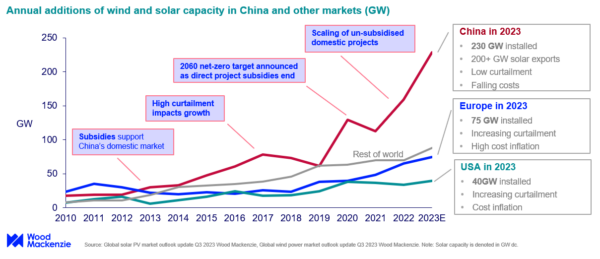From pv magazine Global
The massive increase in solar module production capacity and PV installations in China is helping the country to maintain relatively low, stable power prices compared to Europe and the United States, which suffer from rising PV curtailment and high inflation, according to Wood Mackenzie. Th US-based market research company describes China’s current energy transition trajectory as a virtuous circle in a scenario characterised by falling interest rates, low energy costs, and intense price competition.

This content is protected by copyright and may not be reused. If you want to cooperate with us and would like to reuse some of our content, please contact: editors@pv-magazine.com.









By submitting this form you agree to pv magazine using your data for the purposes of publishing your comment.
Your personal data will only be disclosed or otherwise transmitted to third parties for the purposes of spam filtering or if this is necessary for technical maintenance of the website. Any other transfer to third parties will not take place unless this is justified on the basis of applicable data protection regulations or if pv magazine is legally obliged to do so.
You may revoke this consent at any time with effect for the future, in which case your personal data will be deleted immediately. Otherwise, your data will be deleted if pv magazine has processed your request or the purpose of data storage is fulfilled.
Further information on data privacy can be found in our Data Protection Policy.